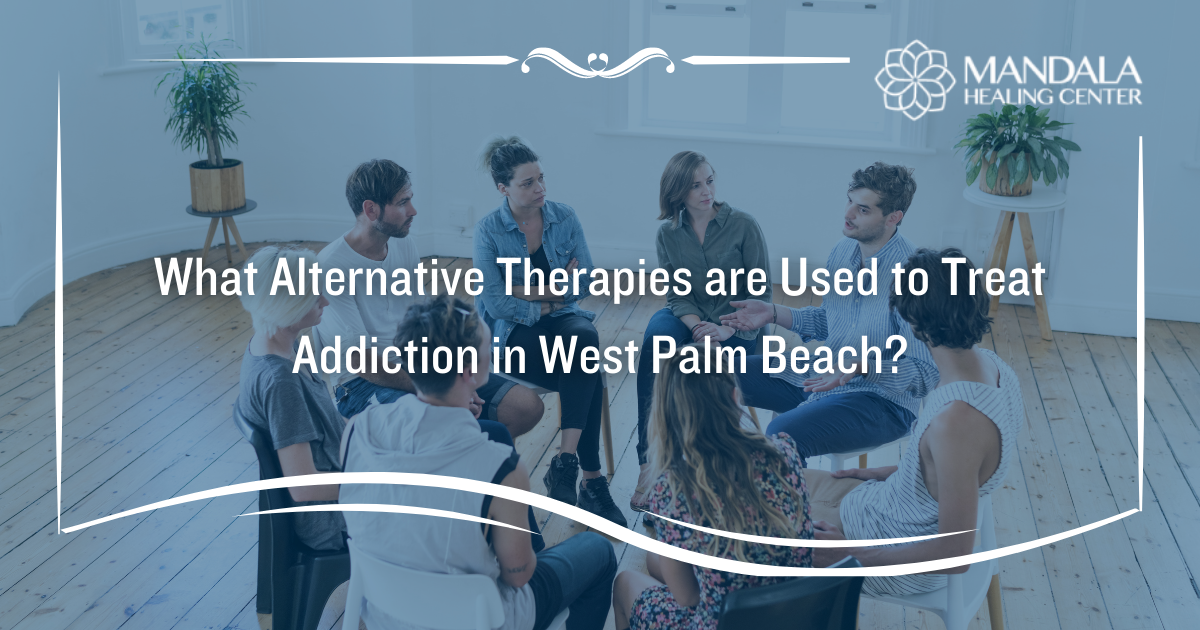Alcoholism and drug addiction are difficult conditions to live with. The consequences of leaving addiction untreated can be devastating, with overdose and death being a major concern. Professional addiction treatment works by healing the effects of addiction on the mind, body, and soul. Additionally, specialized therapies help patients learn healthy coping mechanisms to prevent them from falling back into old patterns of substance abuse.
While traditional addiction treatment has been proven highly effective, there is no one-size-fits-all solution to recovery. Addiction is a chronic condition, meaning relapse is a part of many people’s stories. Because of this, even the best addiction treatment programs cannot guarantee lifelong sobriety.
However, there are alternative forms of treatment for individuals to utilize as a preventative measure. Alternative therapies are a form of non-mainstream addiction treatment strategies that help individuals prevent themselves from relapsing. Some forms of alternative therapies include yoga therapy, mindfulness-based therapy, psychodrama, and neurofeedback. These holistic approaches to drug addiction recovery help individuals stay healthy while preventing psychological triggers from occurring.
Complementary and Alternative Medicine Treatment for Drug Addiction (CAM)
The U.S. National Library of Medicine describes CAM as, “therapeutic practices that are not typically used in current conventional allopathic medical practice, such as diet, acupuncture, and meditation.”[1]
This form of alternative addiction treatment is intended to be used in conjunction with traditional forms of treatment, such as behavioral therapies and medical detox programs. When CAM is used as a supplement during formal addiction treatment, individuals experience higher rates of success and lower rates of relapse.
As stated by the U.S. National Library of Medicine, “Some evidence shows the effect of CAM practices, such as mindfulness meditation (MM) and motivational enhancement, in decreasing SUD relapse and substance-related injuries.”[1]
Some of the most common forms of complementary and alternative medicine that are used to treat addiction in West Palm Beach include:
Emotional Freedom Techniques (EFT)
Emotional freedom techniques (EFT) is a form of therapy utilized to lower stress, anxiety, depression, and negative behaviors. EFT is often referred to as “tapping” because it requires the individual to use their fingers to tap on acupressure points or meridians on their bodies. The tapping is done in a specific sequence that works to mentally balance the individual and remove psychological blocks.
While tapping, the individual will verbalize statements describing the current turmoils they face. This allows them to practice radical acceptance and separate their emotions and feelings from the issues they face. EFT is beneficial in addiction treatment as it helps the individual address the underlying causes of their substance abuse.
Biofeedback and Neurofeedback
EEG biofeedback and neurofeedback are two more types of alternative therapies utilized in addiction treatment settings to monitor physiological changes in the brain, showing doctors which psychological processes need to be treated. This is extremely helpful, as co-occurring disorders are very common among individuals with substance use disorders. When a person has an undiagnosed mental health condition, recovery from addiction can be difficult – if not impossible. This is because the symptoms of their untreated disorder will trigger their drug addiction, leading to an unnecessary relapse.
According to The National Institutes of Health, “The SUD is a complex series of disorders with frequent comorbidities and EEG abnormalities of several types. EEG biofeedback has been employed in conjunction with other therapies and may be useful in enhancing certain outcomes of therapy.”[2]
This form of alternative therapy allows patients to recover from unknown psychological issues during their addiction recovery process. As a result, their chances of relapse lower significantly.
Mindfulness-Based Therapy
People who struggle with addiction typically abuse substances to self-medicate difficult emotions, trauma, or undiagnosed mental health conditions. When someone is self-medicating, they become out-of-touch with their bodies and minds. Mindfulness-based therapy is a process that addresses this by increasing personal awareness and reconnecting individuals with themselves.
Examples of mindfulness-based therapy exercises include yoga, meditation, breathing exercises, and thought awareness exercises.
Psychodrama Therapy
Addiction and trauma typically come hand in hand. Oftentimes, individuals with a history of untreated trauma turn to substances as a form of self-medication. Individuals need to recover from their trauma during addiction treatment to be successful on a long-term basis. Because of this, psychodrama therapy is a popular form of complementary and alternative medicine that is used during addiction treatment.
Psychodrama therapy is a form of experiential therapy. This therapeutic approach asks patients to act out scenes related to the trauma they have experienced under the supervision of a qualified psychologist. This helps individuals gain insight into buried emotions related to their trauma while teaching them coping mechanisms to utilize when they feel triggered.
Experience Alternative Therapies in Addiction Treatment
Alternative therapies are extremely beneficial when used as a supplement in conjunction with traditional addiction treatment methods. By combining evidence-based behavioral therapy and holistic therapy, individuals receive a well-rounded foundation for sobriety.
At Mandala Healing Center, we utilize both traditional treatment and complementary and alternative medicine to provide our patients with the best chances of lifelong recovery. Contact us today for more information on how to get started.
References:












